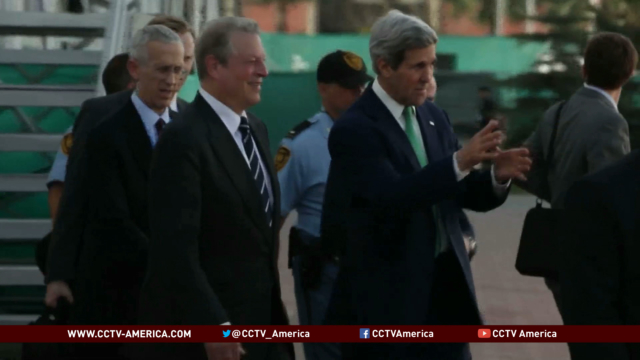As the United Nations Climate Change Conference in Lima, Peru winds down, CCTV America correspondent Stephen Gibbs looks back on the last two weeks.

They came from every country in the world. There were about 14,000 attendees. And what did they do for 12 hot days in the Peruvian capital? They talked and talked and of course were talked about. Some will say that all this has amounted to a lot of hot air.
Others argue the importance of climate change and cutting carbon pollution is vital. Keeping a green conference green is always a challenge. This event – which has cost the Peruvian government $60 million will leave a larger carbon footprint than any of its 19 predecessors.
Its whole infrastructure was built from scratch. And air conditioners have been working non-stop to keep those conversations about global warming, comfortably cool.
Many of those that came here will next meet in Paris, at the United Nations 21st climate change summit. Some leave here disappointed. Others are still travelling hopefully.
More than 190 nations were at a crossroads as talks on how to combat climate change extended beyond the set deadline. Negotiations are continuing amid fears that low ambition could undermine the crucial UN climate change summit in Paris next year. CCTV America’s Dan Collyns reported this story from Peru.

Climate talks rarely finish on time and these are no exception. Cracks have emerged along familiar fault lines on who should bear the burden of cutting greenhouse gas emissions. But as talks continued, delegates of the most climate vulnerable countries were hopeful for a deal:
“We have survival stakes here so we expect the best we can, it will have to be something substantial. All texts will satisfy this movement forward we will figure out how to fix it, if it needs fixing, but we need some agreement to carry forward to Paris,” Tony de Brum, Foreign Affairs minister for the Marshall Islands said.
Global negotiators are trying to prepare the elements for a new climate deal to be signed next year in Paris. But developing nations says the text doesn’t include financial aid to help them cope with climate change – especially small islands.
“As we’ve always said for small island developing states, there are things that you cannot adapt to. If you’ve lost your coral reefs, if you’ve lost your coastlines, you can’t adapt to that, so loss and damage is important for us,” James Fletcher, delegate for Saint Lucia said.
But richer nations like the U.S. said a deal was crucial, the details could be ironed out next year.
“Failing to produce the decision before us will be seen as a major breakdown and will deal a serious blow to the confidence of parties and others as we approach Paris,” Todd Stern, U.S. climate change negotiator said.
Most delegates say the text is far from perfect and no single country appears to be completely satisfied. But time is running out to find a compromise. Some observers say a bad deal is worse than no deal.
“What we don’t want to see here is something that locks us in to low ambition that locks developing countries into having to make commitments that they don’t actually have the capacity to meet because there’s no finance,” said Brandon Wu, from ActionAid International.
 CGTN America
CGTN America
